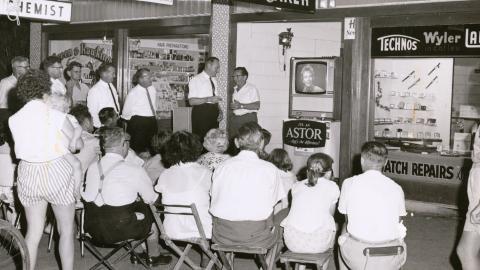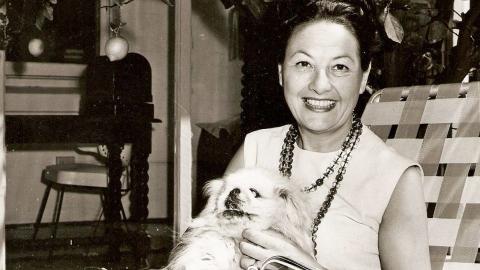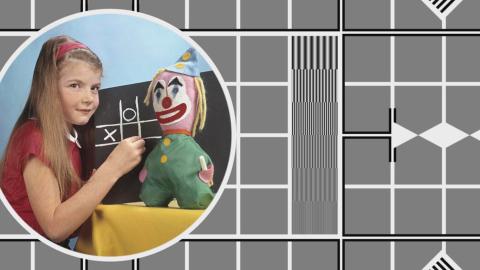

Women leaders in television
The NFSA joined with nine other organisations in 2014 to promote a new understanding of Australian women’s leadership in the 20th century. The result was Australia’s first online Encyclopedia of women leaders. As part of the project we highlighted the cultural achievements of nine outstanding women in film, radio and television.
Patricia Edgar

Persistence, determination, and commitment to working for the benefit of community have been the hallmarks of Patricia Edgar’s career – a career that changed forever what Australian children saw on television and demonstrated to the world the potential of the moving image as a source of learning, mystery, and engagement for young people.
Born in Mildura, Victoria in 1937, Edgar was academically successful, coming third in Geography for the Victorian Matriculation and winning a place at the University Women’s College at Melbourne University. There she completed her BA and whilst at her first teaching placement at Norlane High School, undertook her Bachelor of Education.
In October 1960 she married Don Edgar.
Edgar and Don had two daughters and, challenging traditional expectations of the day, Edgar returned to the workforce after the birth of her children, taking on two part-time positions. The first involved teaching at the Council of Adult Education. Edgar developed a course on the changing role of women which attracted media attention and high enrolments from women wanting to learn and participate in a wider life. Second, she was appointed to the newly established role of Secretary for the Victorian Association for the Teaching of English. In this position Edgar coordinated the professional body, produced its first magazine and ran the annual conference.
In 1966 Edgar accompanied her husband to the United States, where he undertook a PhD and Edgar was able to explore her interest in film and television, completing a Masters in Communication at Stanford University and, significantly, an internship with KQED, a public TV channel in San Francisco. Reluctantly returning to Australia in 1969 Edgar found the older traditional attitudes to women still entrenched. Looking for something new she was appointed as the first Chair of La Trobe University’s Centre for the Study of Educational Media and Communication, thus beginning a university career that would see her introduce the first film courses to an Australian university and the attainment of her PhD (1974) on self esteem and the perception of children’s understanding of film violence. The subject area would become central to her career and also that of her book, Children and Screen Violence (1977). Edgar’s expertise has led to many board positions, notably the Australian Film Television School Council and eight years as Deputy Chair with the Film Finance Corporation (1988-1995).
Edgar’s ongoing interest in the role of women and sexism in the media became the theme of her book, Media She (1974). In 1975, International Women’s Year, Edgar was appointed to the Australian Broadcasting Control Board (ABCB) Advisory Committee for Television Standards as Chair of the Advisory Committee on Program Standards. Subsequently Edgar became the first woman to be appointed to the ABCB, and was then appointed to the ABCB’s successor, the Australian Broadcasting Tribunal, on the Children’s Program Committee. This began a career in media policy development in which she actively helped drive the introduction of a children’s drama quota for free-to-air Australian TV and oversaw the introduction of the ’C Classification system’ which set standards for Australian children’s television.
Another public presentation, the 2nd annual John Grierson Lecture (1979), opened the next door in Edgar’s career. The lecture during the International Year of the Child, on the topic Children’s Television: the Past, the Present and the Future , was read by the Victorian Minister for Education, Norman Henry Lacy. He shared Edgar’s vision for the creation of a not-for-profit foundation responsible for the production of drama programs specifically for children. After three years of political advocacy and hard work the Australian Children’s Television Foundation (ACTF) was established in 1982 with Edgar as its first director.
Under her guidance the ACTF produced 165 hours of children’s production over the next 20 years. The programs, commencing with Winners (1985), included the well known and highly acclaimed Touch the Sun (1988), Round the Twist (1989-2001), Lift Off (1992-96) and Noah and Saskia (2004) and the feature film Yolngu Boy (2001). Over this period ACTF productions won 90 Australian and international awards and were sold to over 100 countries, helping establish Australia as a leading producer of children’s programs.
Edgar’s services to children’s education and children’s television have been recognised in Australia and abroad. She received the Order of Australia for services to children’s television and the media in 1986 and numerous other awards including the AFI Raymond Longford life achievement award (2001) and in the same year was presented with the Centenary Medal by the Governor General.
Patricia Edgar interviewed by Ina Bertrand (2006), Oral History. NFSA title: 715326
BY HELEN TULLY
References
Archival
Edgar, Dr Patricia interviewed by Dr Ina Bertrand, NFSA title: 715326
Edgar, Dr Patricia interviewed by Christine Hogan, NFSA title: 738917
Published
Edgar, Patricia, Bloodbath, 2006, Melbourne University Press, Melbourne
Margaret Pomeranz

Margaret Pomeranz (née Jones-Owen) was born in 1944 in Sydney. Her love of cinema was ignited at a young age by the Saturday afternoon matinee of double feature, short and serial at her local cinema.
Margaret enrolled in Engineering at the University of Sydney, however her interest in the Humanities and the Arts was better suited to the newly established Macquarie University, where she enrolled in an Arts degree. In the middle of her studies, fleeing the conformity of 1960s Australia, Margaret spent two-and-a-half years in Vienna. It was during this period she had her first taste of working in the media, employed as a stringer by the Bulletin and for the Australian Broadcasting Corporation’s Rural Radio. She passionately embraced European intellectualism and the philosophical freedom it provided.
Returning to Australia in early 1971 she finished her degree at Macquarie University and then enrolled at the National Institute of Dramatic Arts where she undertook took a screenwriting course at the Playwrights Studio. She also met and married Hans Pomeranz, the dynamic founder of Spectrum Films, which Margaret describes as ‘the vortex of the New Wave’ (Pomeranz, 2010). It was during this period that she accumulated knowledge of film and television production and post-production sectors.
Margaret became writer/producer at the newly formed Special Broadcasting Service in 1980 where she established The Movie Show with David Stratton in 1986. Unable to find a female to co-host the program, senior management and Stratton convinced Margaret to take on the role on what was thought to be a short-term arrangement. The show ran until 2004, when it moved to the ABC and rebadged as At the Movies. During her time at SBS she was Executive Producer on Front Up, Subsonics, the AFI Awards, and the IF Awards. She is a past President of the Film Critics’ Circle of Australia and past Chair and Vice-Chair of Watch on Censorship which disbanded in November 2012. Margaret has served on the Advertising Standards Board and was a member of the inaugural Australian Writers’ Foundation.
Margaret is known for her fierce loyalty, self-deprecating humour and outspokenness which have made her the focus of both criticism and praise from both friends and foes in the turbulent Australian media landscape. Margaret has often found herself as the focus of media attention, particularly related to issues of freedom of speech and film censorship. A visible example was the circumstances surrounding the Office of Film and Literature Classification’s banning of the film Ken Park in 2003 when she found herself temporarily detained in police custody after attempting to screen the film. Margaret was made a Member of the Order of Australia in 2005 for her service to the film industry as a critic and reviewer, promoter of Australian content, and advocate for freedom of expression in film.
BY GAYLE LAKE
References
Online
Margaret Pomeranz, Hector Crawford Memorial Lecture, as reported in The Australian, 2010
Maggie Tabberer

Maggie Tabberer has been in the public spotlight for over 50 years. A leading lady in both fashion and the media, she has maximized this appeal to become a true role model. Born Margaret May Trigar in December 1936 in Adelaide she started modelling at the age of 14, enrolling in a modelling academy owned by Jill Robb. At 23 she was discovered by leading German-Australian photographer Helmut Newton.
Maggie’s public profile led to a role in television, when asked if she would be interested in doing a pilot for a show called Beauty and the Beast. The panel show made Maggie a national star and she was offered her own show, Maggie, on Channel 7 from 1969 to 1970. In 1970 and 1971 Maggie won back-to-back Gold Logies for Beauty and the Beast, the first woman to win consecutive awards.
Her popularity also led to freelancing work with radio 2GB and the ABC and she hosted several specials for network television. With a strong work ethic and commitment to her family, women, broadcasting and fashion, Maggie had many commercial contracts and a successful business when she launched her own fashion brand Maggie T. Maggie T caters for plus-size women and now retails through 27 stores across Australia.
In 1981 she started her highly successful 15-year role as fashion editor for the Australian Women’s Weekly. Maggie was a driving force behind the presentation, production and coordination of the Weekly’s Australian Fashion Awards which ultimately won a High Distinction at the International Emmy Awards 1982.
Maggie returned to television in 1990 with vigour after a 15-year break with The Home Show (1990-1993, ABC) co-hosted with her then partner Richard Zachariah. It was pioneering infotainment for television, preceding or coinciding with Burke’s Backyard and Healthy Wealthy and Wise. The show only lasted three years but subscription television brought a new opportunity with Foxtel, where the Maggie…At Home With series launched in 2001. In 2008 the series evolved into Maggie With, a show in which she interviewed famous Australians in their homes.
Maggie Tabberer has used her outgoing personality, savvy business skills and entrepreneurial talents to secure a place as one of the most popular personalities and business women in Australia. From her position of leadership in television, fashion and the media, she has inspired several generations of Australian women.
Excerpt from This Is Your Life: Maggie Tabberer (Lifetime Associates Pty Ltd, Australia 1976). Courtesy of Lifetime Associates Pty Ltd. NFSA title: 32241
BY FRANCES BALDWIN
References
Archival
Tabberer, Maggie interviewed by Pauline Fanning, NFSA title: 17074
Tabberer, Maggie interviewed by Christine Hogan, NFSA title: 738887
This is Your Life – Maggie Tabberer, Episode 2/026, 26 September 1976, NFSA title: 32241
Published
Harrison, Tony, Australian Film and TV Companion (2nd edition), 2005, Citrus Press, Sydney
Hogan, Christine, Look at Me!, 2006, ABC Books, Sydney
Tabberer, Maggie, Maggie, 1998, Allen and Unwin, Sydney
Online
‘Maggie Tabberer AM’, Harry M Miller Group website
‘Maggie With… Final Series Premiere’, Throng Media website
The National Film and Sound Archive of Australia acknowledges Australia’s Aboriginal and Torres Strait Islander peoples as the Traditional Custodians of the land on which we work and live and gives respect to their Elders both past and present.


